最新人教版新目标九年级英语1-10单元教案(完整版)
- 格式:pdf
- 大小:29.67 MB
- 文档页数:106
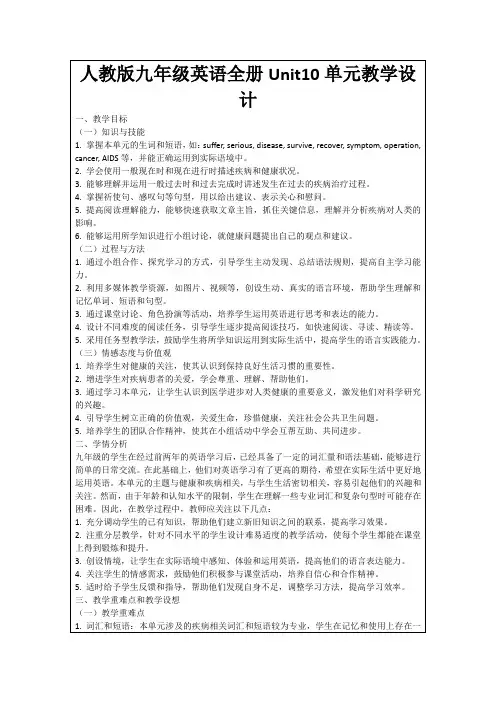

Unit 1 How can we become good learners?Language GoalTalk about how to study【语言目标】Knowledge Goals【知识目标】textbook , conversation ,aloud , pronunciation ,sentence ,patient ,expression ,discover ,secret ,grammar, repeat , note , physics , chemistry ,Key Words,speed,partner ,born ,ability ,pronounce ,increasecreate ,brain ,active ,attention ,connect ,review ,knowledge , wiselylook up,help ,fall in love with ,be born Key Phrases,connect withwith , pay attention to— How do you learn English?—I learn by studying with a group.2.— Do you learn English by reading aloud?— Yes, I do.It helps my pronunciation.Key Sentences3.— How can I read faster?— You can read faster by reading word groups.4.— How can I improve my pronunciation?—One way is by listening to tapes.Learn to use “verb +by doing(gerund) ”to express Key Grammarways of doing things.listening ,speaking ,reading and writingskills by using the target languages.Ability Goals 2 . Learn to talk about ways of studying , give suggestions to help others overcome their【能力目标】obstacles in study and discuss how to learn betterusing “by doing sth. ”.the help of this unit's study ,students canthink and learn how to study English and they will Moral Goals be encouraged to be active and hard - working 【感情目标】learners.2.Learn to communicate and cooperate with othersin study.Teaching Time【课时】Five periodsPeriod 1 Section A(1a - 2d)Period 2 Section A(3a - 4c)Period 3 Section B(1a - 1e)Period 4 Section B(2a - 2e)Period 5 Section B(3a - 3b) & Self Check本单元环绕学习的话题,叙述了学习的阻碍及对应的解决方法,对学生的学习有重要意义。

第 10单元(章)教材分析一、 教材分析本单元重点学习一些常见国家的英文表达,以及该国在初次见面时的行为与语言, 该话题能激起学生的好奇心,调动学生学习英语的积极性。
其中有听力练习也有口语练习。
内容相对来说较简单,重点帮助学生练习“be supposed to do ” 的用法,在不断的练习中达到掌握以及熟练运用的目的。
二、教学目标和要求知识目标:1、能够使用be supposed to do 谈论不同国家人们初次见面时的礼仪2、掌握关键词:shake hands , bow , kiss ,custom3、句型: A: What are you supposed to do when you meet someone for the first time?B: We are supposed to shake hands/bow/kiss.4、句型“should have + done ”能力目标:正确运用短语:be supposed to, should do something ,情感目标:本单元以谈论“习俗”为话题,了解各地不同的文化知识,从而让学生知道哪些是应该做的,哪些是不应该做的,要学会尊重不同的文化,养成良好的行为习惯,培养学生的学习兴趣。
三、教学重点1. The customs of some countries.2. Tell what you are supposed to do in different situations. 四、教学难点Can use “be supposed to” correctly. 五、教学准备录音机 课本 课件 多媒体设备。
单元课时分配:5课时Period 1 Section A (1a-2d) Period 2 Section A (3a-3c) Period 3 Section A (Grammar Focus-4c) Period 4-5 Section B (1a-2e ) Period 6 Section B Section B 2 (3a-Self Check)9年级英语教案人教版人教版&九年级英语学科全册第 9单元(章)九年级英语学科全册第 9单元(章)九年级英语学科全册第 9单元(章)九年级英语学科全册第 9单元(章)九年级英语学科全册第 9单元(章)。

(完整版)人教版新目标初中九年级英语全册教案-CAL-FENGHAI-(2020YEAR-YICAI)_JINGBIANUnit 3 Teenagers should be allowed to choose their own clothes.Section AThe Third PeriodTarget language:A: What rules do you have at home?B: Well, I'm not allowed to go out on school nights. How about you?A: I'm not allowed to go out on school nights either. But I can study at a friend's house.教学难点Talk about agreement and disagreement.教学内容及教师活动学生活动设计意图Step 1 RevisionCompetition: Write “are allowed to” and “aren't allowed to” on the blackboard. Divide the class into groups.Each group is asked to write down as many things as they can think of about what teenagers are or aren't allowed to do. See which group can think of the most items for each category.Step 2 PresentationI.1aThis activity reviews the use of always, sometimes, usually and never.Point to the picture. Ask students to describe what is happening in the picture.Help students to say, The boy is late for class. Invite a student to read the four questions in the box to the class.Read the instructions and remind students of the exact meanings of the adverbs of frequency. Work as theteacher says.Look at thepictures and saywhat is happeningin each picture.Students finishthe task on their激发学生兴趣,对所学知识进行复习,使记忆更加深刻。
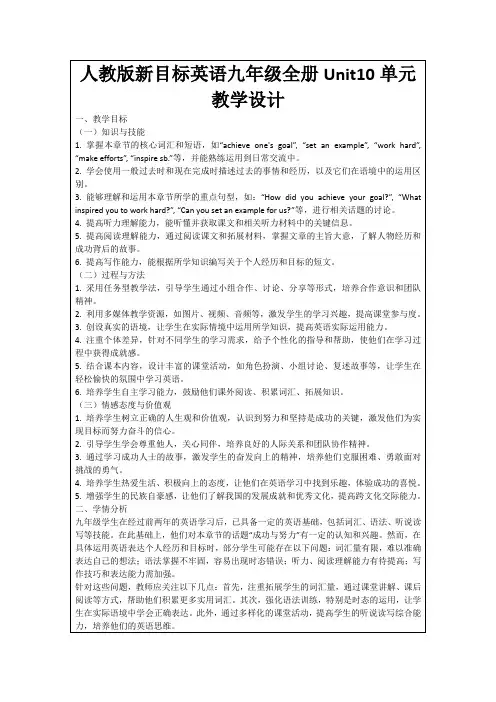
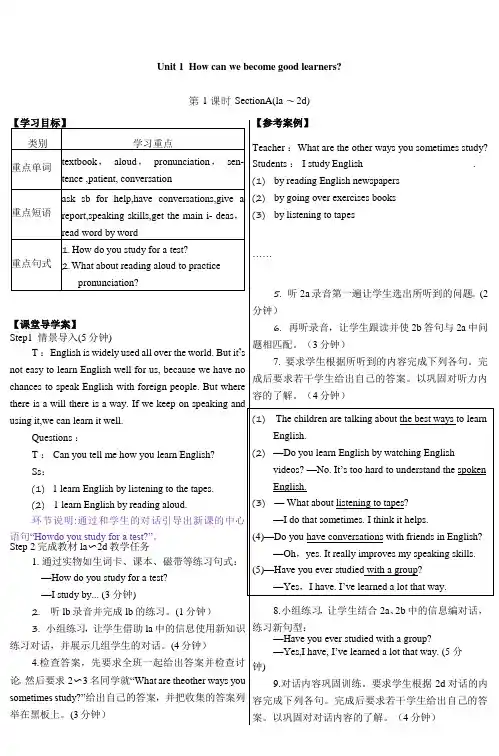
Unit 1 How can we become good learners?第1 课时SectionA(la 〜2d)Step 1复习(2分钟)1. T :Ask “How do you study for a test?' Ss :…2.让学生表演2d 。
【学习目标】【课堂导学案】第 2 课时Section A (3a 〜4c)step 2情景导入(2分钟)Hello, everyone! I know you all want to get good grades in English. Do you know the ways of learning English are very important in learning? Do you learn English in the best ways? Do you have good advice in learning English?环节说明:结合学生学习英语的具体情况,通过一 系列的相关问题来引入新课,让学生的注意力集中在学习方法上。
Step 3完成教材3a 〜3b 教学任务1.默读3a ,回答3a 的三个问题。
(3分钟)2.让学生熟读3a 短文,完成3b 表格的内容。
学 生可分组讨论完成。
(10分钟)3.让学生展示阅读倩况,核对表格答案。
(4分钟)4.根据学生完成练习情况对3a 短文进行适当讲 解。
(6分钟)(1) Jack is a little nervous because he has to finishreading a book and giving a report next Monday.(2) 一Is Jack a good reader?一No,he’s a very slow reader.(3) 一How does Annie read? Does she read word byword?一She reads quickly to get the main ideas at first. She doesn’t read word by word. She reads word groups.(4) We needn ’t use a dictionary to look up every newword we meet when we are reading.(5) Sometimes we can guess the meaning of a new word by reading the sentences before and after it.10. 学生读2d 对话5分钟,然后让几组学生表演 对话。
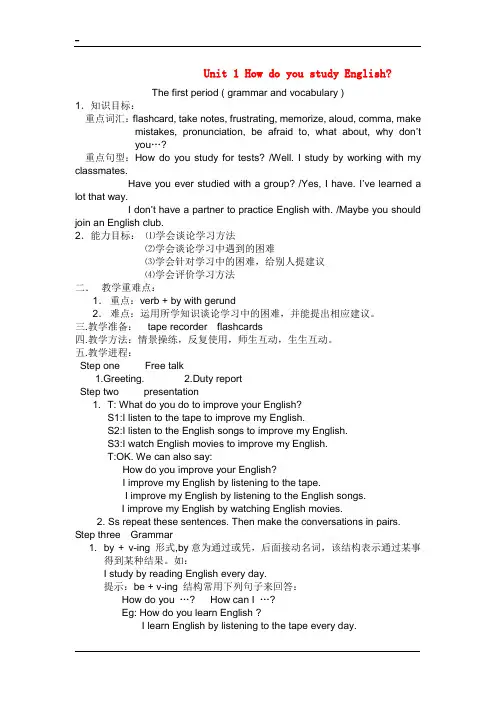
Unit 1 How do you study English?The first period ( grammar and vocabulary )1.知识目标:重点词汇:flashcard, take notes, frustrating, memorize, aloud, comma, make mistakes, pronunciation, be afraid to, what about, why don’tyou…?重点句型:How do you study for tests? /Well. I study by working with my classmates.Have you ever studied with a group? /Yes, I have. I’ve learned a lot that way.I don’t have a partner to practice English with. /Maybe you should join an English club.2.能力目标:⑴学会谈论学习方法⑵学会谈论学习中遇到的困难⑶学会针对学习中的困难,给别人提建议⑷学会评价学习方法二.教学重难点:1.重点:verb + by with gerund2.难点:运用所学知识谈论学习中的困难,并能提出相应建议。
三.教学准备:tape recorder flashcards四.教学方法:情景操练,反复使用,师生互动,生生互动。
五.教学进程:Step one Free talk1.Greeting.2.Duty reportStep two presentation1. T: What do you do to improve your English?S1:I listen to the tape to improve my English.S2:I listen to the English songs to improve my English.S3:I watch English movies to improve my English.T:OK. We can also say:How do you improve your English?I improve my English by listening to the tape.I improve my English by listening to the English songs.I improve my English by watching English movies.2. Ss repeat these sentences. Then make the conversations in pairs. Step three Grammar1. by + v-ing 形式,by意为通过或凭,后面接动名词,该结构表示通过某事得到某种结果。
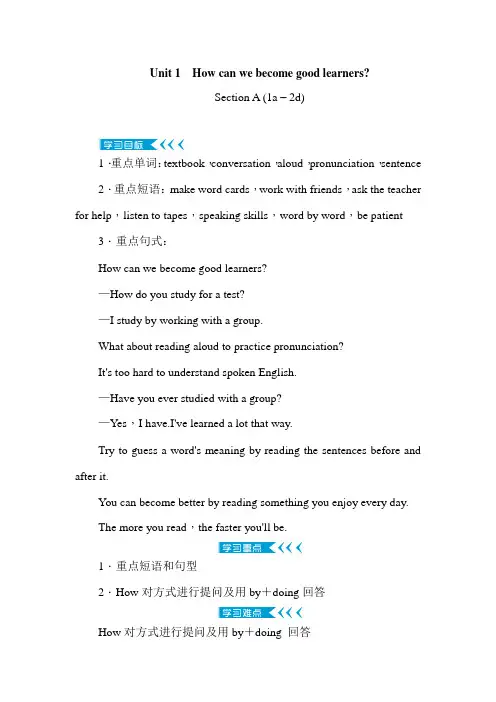
Unit 1How can we become good learners?Section A (1a-2d)1.重点单词:textbook,conversation,aloud,pronunciation,sentence 2.重点短语:make word cards,work with friends,ask the teacher for help,listen to tapes,speaking skills,word by word,be patient 3.重点句式:How can we become good learners?—How do you study for a test?—I study by working with a group.What about reading aloud to practice pronunciation?It's too hard to understand spoken English.—Have you ever studied with a group?—Yes,I have.I've learned a lot that way.Try to guess a word's meaning by reading the sentences before and after it.You can become better by reading something you enjoy every day.The more you read,the faster you'll be.1.重点短语和句型2.How对方式进行提问及用by+doing回答How对方式进行提问及用by+doing 回答一、预习课本P1-2新单词并背诵,完成下面的汉译英。
1.课本____________ 2.交谈____________3.大声地____________ 4.发音(n.)____________5.句子____________ 6.有耐心的____________二、认真预习1a-2d找出下列短语和句型。
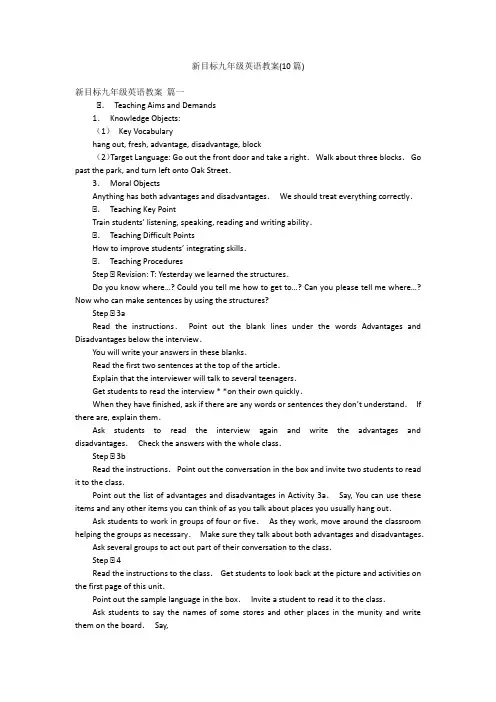
新目标九年级英语教案(10篇)新目标九年级英语教案篇一Ⅰ.Teaching Aims and Demands1.Knowledge Objects:(1)Key Vocabularyhang out, fresh, advantage, disadvantage, block(2)Target Language: Go out the front door and take a right.Walk about three blocks.Go past the park, and turn left onto Oak Street.3.Moral ObjectsAnything has both advantages and disadvantages.We should treat everything correctly.Ⅰ.Teaching Key PointTrain students’ listening, speaking, reading and writing ability.Ⅰ.Teaching Difficult PointsHow to improve students’ integrating skills.Ⅰ.Teaching ProceduresStep Ⅰ Revision: T: Yesterday we learned the structures.Do you know where…? Could you tell me how to get to…? Can you please tell me where…? Now who can make sentences by using the structures?Step Ⅰ 3aRead the instructions.Point out the blank lines under the words Advantages and Disadvantages below the interview.You will write your answers in these blanks.Read the first two sentences at the top of the article.Explain that the interviewer will talk to several teenagers.Get students to read the interview * *on their own quickly.When they have finished, ask if there are any words or sentences they don’t understand.If there are, explain them.Ask students to read the interview again and write the advantages and disadvantages.Check the answers with the whole class.Step Ⅰ 3bRead the instructions.Point out the conversation in the box and invite two students to read it to the class.Point out the list of advantages and disadvantages in Activity 3a.Say, You can use these items and any other items you can think of as you talk about places you usually hang out.Ask students to work in groups of four or five.As they work, move around the classroom helping the groups as necessary.Make sure they talk about both advantages and disadvantages.Ask several groups to act out part of their conversation to the class.Step Ⅰ 4Read the instructions to the class.Get students to look back at the picture and activities on the first page of this unit.Point out the sample language in the box.Invite a student to read it to the class.Ask students to say the names of some stores and other places in the munity and write them on the board.Say,Each group can choose three of these places to write about, or you can choose another place you know ofWrite careful directions from the school to each place, but do not say the name of the place.You can use the words this place instead.In order to help students work, draw a simple map showing the school and several nearby streets.When the groups are ready, they read their directions to the class and the other students guess the name of the place they are talking about.Step Ⅰ Homework1.Ask students to choose two places in the munity and write careful directions from the school to each place.2.Finish off the exercises on pages 46~47 of the workbook.新目标九年级英语教案篇二Paragraph 1When you visit a foreign country, it is important to know how to ask for help politely (adv. 礼貌地)….Paragraph 2Good speakers change the way they speak in different situations. …Paragraph 3Usually polite questions are longer. They include expressions such as “Could you please …?” or “May I ask …?”Paragraph 4However, it is important to learn how to use the right language in different situations. …2) Read the article again and answer the questions.Read paragraph 1 and answer the question.What else do we need to learn besides asking a question correctly when you ask for help?We need to learn how to be polite when we ask for help.Read paragraph 2 and answer the question.What do we need to think about when you talk to different people?We need to think about whom we speak to or how well we know them.Read paragraph 3 and answer the question.What can lead in to a request with a stranger on the street?“Excuse me, I wonder if you can help me” or “I’m sorry to trouble you, but …” before asking for help.2c Find all the direct questions and polite requests from the passage.Direct questions Polite requests1. 1. Where are the restrooms?2. When is the school trip?3. Peter, tell me your e-mail address.4. Where’s the post office?1. Could you tell me where the restrooms are?2. Excuse me, Mr. West.Do you know whenthe school trip is?3. Peter, could youplease tell meyour e-mail address?4. Pardon me, could you please tell me where to park my car?2d Read the requests below. In the second column, write A if you would say it to someone you know and B if you would say it to a stranger. In the last column, write where you think these people are.Request Person Place1. Will you pass the salt? A home2. Do you know where I can change some money, please? B street3. Could you tell me what just happened? A/B any public place/home4. Can you please tell me where the nearest station is? B street5. Excuse me, do you know what time it begins, please? B movie theater6. Let me know when you’re ready, OK? A home7. Could you possibly tell me the way to the village school? B streetStep 9 Language points1. Both are correct, but the first one sounds less polite.less + 形容词或副词,构成降级比较形式,相当于中文“不那么;稍许不……”之意。
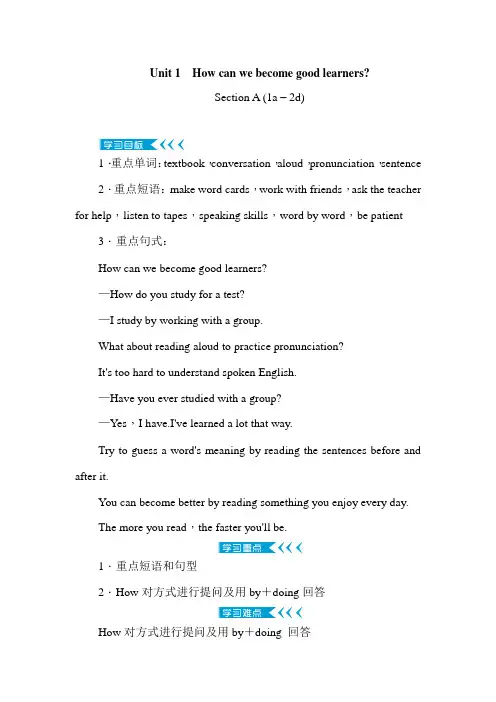
Unit 1How can we become good learners?Section A (1a-2d)1.重点单词:textbook,conversation,aloud,pronunciation,sentence 2.重点短语:make word cards,work with friends,ask the teacher for help,listen to tapes,speaking skills,word by word,be patient 3.重点句式:How can we become good learners?—How do you study for a test?—I study by working with a group.What about reading aloud to practice pronunciation?It's too hard to understand spoken English.—Have you ever studied with a group?—Yes,I have.I've learned a lot that way.Try to guess a word's meaning by reading the sentences before and after it.You can become better by reading something you enjoy every day.The more you read,the faster you'll be.1.重点短语和句型2.How对方式进行提问及用by+doing回答How对方式进行提问及用by+doing 回答一、预习课本P1-2新单词并背诵,完成下面的汉译英。
1.课本____________ 2.交谈____________3.大声地____________ 4.发音(n.)____________5.句子____________ 6.有耐心的____________二、认真预习1a-2d找出下列短语和句型。
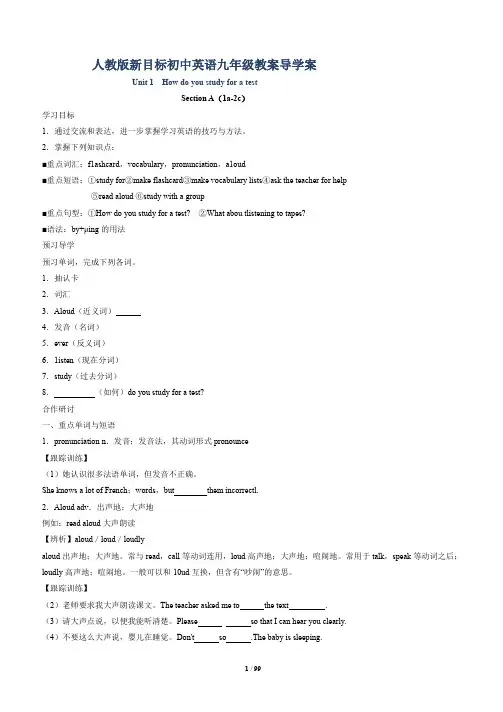
人教版新目标初中英语九年级教案导学案Unit 1 How do you study for a testSection A(1a-2c)学习目标1.通过交流和表达,进一步掌握学习英语的技巧与方法。
2.掌握下列知识点:■重点词汇:f1ashcard,vocabulary,pronunciation,a1oud■重点短语:①study for②make flashcard③make vocabulary lists④ask the teacher for help⑤read aloud ⑥study with a group■重点句型:①How do you study for a test? ②What abou tlistening to tapes?■语法:by+μing的用法预习导学预习单词,完成下列各词。
1.抽认卡2.词汇3.Aloud(近义词)4.发音(名词)5.ever(反义词)6.1isten(现在分词)7.study(过去分词)8.(如何)do you study for a test?合作研讨一、重点单词与短语1.pronunciation n.发音;发音法,其动词形式pronounce【跟踪训练】(1)她认识很多法语单词,但发音不正确。
She knows a lot of French;words,but them incorrectl.2.Aloud adv.出声地;大声地例如:read aloud大声朗读【辨析】aloud/loud/loudlyaloud出声地;大声地。
常与read,call等动词连用,loud高声地;大声地;喧闹地。
常用于talk,speak等动词之后;loudly高声地;喧闹地。
一般可以和10ud互换,但含有“吵闹”的意思。
【跟踪训练】(2)老师要求我大声朗读课文。
The teacher asked me to the text .(3)请大声点说,以便我能听清楚。
(完整版)人教版新目标九年级英语全册学案及教学设计【经典】unit 1 How do you study for a test?一、教学目标1、语言目标1)询问别人的学习方法2)学习讨论各种学习方法和策略,学会评价各种学习方法的优劣2、知识目标1)How do you study for a test?I study by ving .2) the way to do sth the way of doing sthhave trouble doing sth 的用法3、能力目标1)通过讨论找到适合自己的学习方法,找出自己在英语学习中的困难2)学会给出关于学习方法的建议二、重点知识1、重点单词flashcard vocabulary aloud pronunciation memorize grammar frustrating quickly spoken pronounce mistakes challenge solution realize matter afraid complete impress trouble soft deal unless regard influence friendship development face 基本要求:会读、会写、会用。
2、重点短语make mistakes be afraid to do sth laugh at enjoy doing sth the way to do sth have trouble doing sth end upspoken English practice doing sth too much look upmake vocabulary lists try one`s best to do sth基本要求:会读、会写、会用。
3、重点语法1)How 引起的特殊疑问句及其回答2)the way to do sth the way of doing sthhave trouble doing sth 的用法基本要求:理解其含义,学以致用。
九年级英语:全一册英文版教案Unit 1How can we become good learners?Language Goal【语言目标】Talk about how to study Knowledge Goals【知识目标】Key Words textbook,conversation,aloud,pronunciation,sentence,patient,expression,discover,secret,grammar,repeat,note,physics,chemistry,pronounce,increase,speed,partner,born,ability,create,brain,active,attention,connect,review,knowledge,wiselyKey Phrases look up,ask sb.for help,fall in love with,be born with,pay attention to,connect…withKey Sentences1.—How do you learn English?—I learn by studying with a group. 2.—Do you learn English by reading aloud?—Yes,I do.It helps my pronunciation.3.—How can I read faster?—You can read faster by reading word groups. 4.—How can I improve my pronunciation?—One way is by listening to tapes.Key Grammar Learn to use “verb+by doing(gerund)” to express waysof doing things.Ability Goals 【能力目标】1.Develop listening,speaking,reading and writing skills byusing the target languages.2.Learn to talk about ways of studying,give suggestions to help others overcome their obstacles in study and discuss how to learn better using “by doing sth.”.Moral Goals 【情感目标】1.With the help of this unit's study,students can think and learn how to study English and they will be encouraged to be active and hard-working learners.2.Learn to communicate and cooperate with others instudy.Teaching Time【课时】Five periodsPeriod 1 Section A(1a-2d) Period 2 Section A(3a-4c)Period 3 Section B(1a-1e)Period 4 Section B(2a-2e)Period 5 Section B(3a-3b) & Self Check本单元围绕学习的话题,讲述了学习的障碍及对应的解决方法,对学生的学习有重要意义。
2023版人教新目旳九年级英语上册全册教案Uuld you please tell me ware?一、教学目旳:语言知识目旳基本词汇:amp, bard, pardon, wabaal, rush, suggest, staff, graal, mail, east, fascinating, convall, cllite, politely, speaker, request, ddirect, whom, address, underground基本句型:Excuse me, do you know where I can budicine?Sure. There’s a supermarket dowuld you please tell me how to g?I’m not sure how to gI wonder where we should go nexuld you tell us wband starts playing this evening?You should try that new ride ov2. 技能目旳: (1)能用宾语从句礼貌旳寻求协助。
(2)能用对旳旳措施指路。
情感目旳: 培养学生尊重他人,对人有礼貌,热爱生活。
二、教学重难点:教学重点:(1)礼貌旳向他人寻求协助。
(2)对旳使用宾语从句。
2. 教学难点:运用宾语从句礼貌旳寻求协助。
三、教学环节:A 1 (1a-2d)Warming –uGreeting2 Presenta(1)Guessing gaw pictuwhole claudent explalagl ish and awho doesn’t look at the blackboard guesses what plaFor exampludent say: We can savxchanglace, agua bank. Get studgulaces like babuseum, bawaall and(2)Showaudents andw:uld you tell me where I can buamps?uld you please tell me where I can get a dictionary?Do you know where I can gagazines?Pra)Match each thing with a plaure in 1a.2)Reada___ g___ gaga___ have d___ get a dictionary ___ gation abouwn___ buy a newspa___ bua___ get a paListeningListen and complversaure in 1a. Tanswers wwhole claPraake conversations usingaa. Then talk about your owFor example:A: Excuuld you please tell me how to gb?B: Sure, just go along Mauntil you paThe bur right, beside the baA: Thanks. Do you know wbloses today?B: It closes at 7:00day.A: Thank you!B: You’re welListeningListen and number the dder that you hea2a You will headbelow. Number the dder you hea___ Gbird fl___ Turn l___ Gd fl___ Turn rig___ The supermabetwlowand the b___ Go past the b2. Listen again. Show how the boy walupermarket. Drawa lure in 2a. Then gudent draw the lblackboard.3. Ld time and answer the qu) Excuan you tell me whereI can budicine?2) Do you know how to go there?3) OK, great. Oh, andg. Do you know wglght?4) OK, thanks a lPairwake conversations aboulaure in 2a.A: Excuan you tell me where I can buamps?B:’s agA: Do you know how to go there?B: Yes. Gd floor and turn right. Then go past the bank. Tbetween museum and library. You should be able to get staA: O K, great. Oh, andg. Do you know …B: I’m not sure, but you …A: OK, thanks a lB: You’re welReadingReadversa2d and answer the qu2. Role –plaversaxplain the languag2d.(1) Go along Mauntil you pa) until和 till同义为“直到……” ,till多用于口语,until可以放在句首,till则不能放在句首。